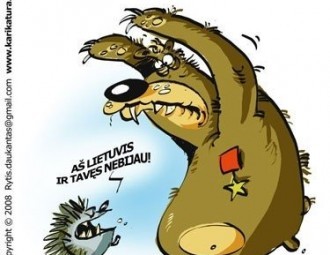Nerijus Stasiulis: Conflicts and wars became the business of state structures

Baltic States are very often referred to as the next object of Russia’s aggression after Ukraine. Why? How do the Baltic peoples perceive the Russia-Ukraine conflict?
Attitude to Russia among Baltic States has always been controversial. Crimea’s annexation and military conflict in Donbas made Lithuania, Latvia, and Estonia be even more cautious about their aggressive neighbor.
However, Baltic States certainly don’t want to disrupt their relations with Russia, even though they are cautious about the politicians who are starting to be taken ill with the imperial greatness.
The peculiarities of attitude towards Russia on the part of Lithuanian citizens in the interview with “EuroBelarus” Information Service told the deputy of the city council of Palanga Nerijus Stasiulis.
- How do the citizens of a little Lithuanian town perceive the conflict between Russia and Ukraine?
- As all peaceful people in the world: they are afraid when hostilities are taking place, especially when they happen not far from their home country.
On the one hand, our town is a touristic place; thus, it is a crossroads of all cultures. We love all our guests whatever the nation they belong to. We are trying to connect nations through culture, not alienate them.
On the other hand, geopolitical shakes directly influence the number of tourists that visit us and their economic opportunities linked to the consequences of military conflicts.
We are trying to do everything that depends on us: we are strengthening cultural ties and exchanging the information. Time will show how the Russia-Ukraine conflict will be developing in the future. But we, of course, want world peace.
- What influence does Russian information area has on Lithuanian citizens, taking into account that Russian Kaliningrad is so close to you? We can assume that the influence is not the most positive one, as from time to time broadcast of different Russian channels is prohibited.
- In the modern world one can find any information in the Internet, through a satellite. Prohibition of TV-channels’ broadcast is rather a psychological trick, as any country has its politics, its own tactics, and strategy.
I’m trying to watch Lithuanian, Russia, Ukrainian, and other foreign TV-channels, and try to identify real truth after the general analysis.
Television is a big instrument of influence on people’s conscience and it is hard to control it completely. We just need to explain more, so that people think by themselves instead of assuming that what they see on TV is an absolute truth.
- What is the attitude of an average Lithuanian to Russians?
- It is hard for me to speak for an average Lithuanian, as the touristic character of our town leaves its trace on the perception of those quests that come to us. We are happy to see any tourist that visits our town; we don’t divide them according to the nationality.
If we consider the political side of the situation, the perception will be somewhat different, as the conflict with the neighboring state with which we were living together in one country is not the best characteristic. It is always bad when simple people die because of someone’s territorial interests, power interests, and business. And die in thousands.
If one is a humanist, he or she is against any war. Unfortunately, some people like to war.
- They say that the Baltic States might be next object of Russia’s aggression after Ukraine.
- We had already had conflicts between our nations in the history, and not even once. But we neither want to be non-free nor depend on some other country. That is why we support Ukraine as a sovereign state that should have its own laws, borders and so on.
We perfectly understand that military conflicts are dreadful; all the more that Lithuania is a small country without huge opportunities to oppose forceful aggression. That is why we became NATO members, and it helps us. And the country’s authorities are not sitting still and increase costs on army and safety.
- And yet, to which degree do you feel threat to Ukraine on the part of Russia? Your president was saying that if the EU betrayed Ukraine, a day after the situation might repeat in the Baltic States.
- This is our human nature: someone wants peace while someone wants war. If we look globally, states are created by people, who want to lead nations. Often such people are even ready to invent imaginary threats in order to unite population among themselves. Some leaders need conflicts in order to preserve power and make business in war.
Conflicts and wars per se is a business of state structures that want to stay in power, feel needed in the country, and cause fear of those who are weaker.
-
03.01
-
07.10
-
22.09
-
17.08
-
12.08
-
30.09










































